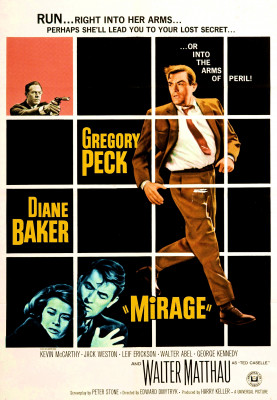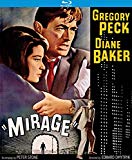| Reviews & Columns |
|
Reviews DVD TV on DVD Blu-ray 4K UHD International DVDs In Theaters Reviews by Studio Video Games Features Collector Series DVDs Easter Egg Database Interviews DVD Talk Radio Feature Articles Columns Anime Talk DVD Savant Horror DVDs The M.O.D. Squad Art House HD Talk Silent DVD
|
DVD Talk Forum |
|
|
| Resources |
|
DVD Price Search Customer Service #'s RCE Info Links |
|
Columns
|
|
|
Mirage
(First-time viewers might want to stop reading here, despite this mostly spoiler-free review, and watch the film cold. It plays best knowing nothing about it going in.)
A Hitchcockian thriller like Charade, Mirage is also a bit like a feature-length version of The Twilight Zone, built around a "What's Going On Here?"-type mystery with a slight but definitely science fiction component. Peck had starred in Hitchcock's Spellbound (1945), which this also resembles, while other parts of the film recall bits from Vertigo (1958) and North by Northwest (1959).
Near the end of the work day, the electricity suddenly goes out throughout a tall New York skyscraper. Unmarried cost accountant David Stillwell (Peck), disinterested in the party atmosphere that follows in the darkness among the white-collar workers on his floor, decides to take his chances navigating his way down the pitch-black stairwell.
Along the way, he meets a young woman, Shela (Diane Baker) who seems to know him, though he doesn't recognize her at all. She disappears into a fourth-level sub-basement, and once outside he learns that, amid all the confusion, a man has apparently committed suicide by jumping from a high window.
Returning to his apartment, he's met by a stranger with a gun, Lester (Jack Weston), who insists Stillwell pack his bags for a trip to Barbados to meet "the Major." Stillwell, who has no idea what Lester is talking about, overpowers him, strangely dumping his unconscious body in a storage closet down the hall from his apartment. On TV, he learns the dead man who jumped was Charles Calvin (Walter Abel, in flashbacks), an internationally famous peace activist.
Stillwell begins noticing other inexplicable things happening around him. His refrigerator has nothing in it at all but later is, unaccountably, chockful of groceries. A colleague, Josephson (Kevin McCarthy), over the phone discusses a holiday trip Stillwell had been planning but now has no memory of. Returning to his office building, he discovers that the four subfloors under the building no longer exist. Reporting the kidnapping attempt to a police detective (Hari Rhodes), Stillwell can't even remember his place and date-of-birth.
Increasingly desperate, Stillwell visits an eminent psychiatrist, Dr. Broden (Robert H. Harris, usually hammy but good here). Stillwell explains that he can't remember anything about his life more than two years back. Broden believes Stillwell to be some sort of criminal trying to establish an alibi and refuses to treat him: to suffer from amnesia for two years without realizing it is simply impossible. Finally, Stillwell hires neophyte private investigator Ted Caselle (Walter Matthau). Caselle is skeptical about Stillwell's plight - that is, until he realizes a strange man (George Kennedy) is trailing them.
This takes us up about the first 30-40 minutes of the film, which is captivatingly weird and engagingly off-kilter. The payoff to the mystery and the story's resolution is mildly disappointing, but overall Mirage is a very good picture. Peck, certainly, was pleased with how it came out: he was so happy with Peter Stone's script that he gave him a Rolls-Royce as a bonus.
With Mirage, Universal was not only hoping to duplicate Charade's success, but perhaps exceed it, only to dial their enthusiasm back a bit later on. The obvious choice to play opposite Peck was the star of Charade, Audrey Hepburn, also Peck's co-star in Roman Holiday (1953), among their most iconic film roles. Hepburn's co-star in Charade, Cary Grant, had by this time retired, so why not pair her with Peck, presently part of Universal's stable of ‘60s leading men?
Assuming Hepburn was even approached and she declined, once she was out of the picture, director Edward Dmytryk reportedly tried to get Tippi Hedren, but she was under personal contract to Alfred Hitchcock, with whom she had famously fallen out of favor. Hitchcock refused to loan her out, even for a film made by Universal, a company in which he was one of the principal stockholders. Leslie Caron, who starred with Grant in the Peter Stone-scripted Father Goose (1964), another big Universal hit, was also reportedly asked, but her boyfriend at the time, Warren Beatty, allegedly talked her out of it.
And so, instead, Mirage settled on Diane Baker, a good actress but not quite a star, though she had played leading parts at 20th Century-Fox, and had recently appeared opposite Joan Crawford in William Castle's cheesy but profitable Strait-Jacket (1964). Still in her twenties Baker, with her fair skin, dark hair, and delicate features, vaguely resembled a young Hepburn.
Dmytryk was a good but not great director of A-list movies with big stars (from the mid-‘40s onward), but whether his films turned out good or bad depended more upon the quality of the source material than Dmytryk's direction. His direction of Mirage is less imaginative, more straightforward than Stanley Donen's on Charade: Mirage's early scenes are fascinating because of the unusual script and Peck's performance, as Dmytryk's direction is pretty lacking in visual flourishes. The resolution at the end is a bit anticlimactic. It seems to heading for a North by Northwest-type spectacular finish, but instead sort of just fizzles out. One wonders if Stone's original screenplay ended differently.
One also imagines that, once it became clear Universal was getting one big star instead of two like Charade, they scaled the production back ever so slightly. It has a good cast, but Matthau and Kennedy were not yet stars, and Baker never quite made it to the top ranks. This is especially clear when the main villain finally appears, in a long scene resembling the climax at James Mason's cliffside hideaway in North by Northwest. Except in Mirage that role is played by utility character player Leif Erickson, a good but bland actor, hardly in Mason's class.
These, however, are minor complaints, as Mirage still impresses all over the place. Quincy Jones's at-times Herrmann-esque score complements the mysterious surroundings, and longtime Fox cinematographer Joseph MacDonald's inky-black 1.85:1 cinematography is wonderfully atmospheric, one of the last Hollywood studio movies filmed in black-and-white.
And, holding it all together, is Gregory Peck, whose performance reveals much without the need of dialogue. As Stillwell, he's a calm and sensible man, thrown into a kind of purgatory world where nothing makes sense. His actions, both in Stone's script and in Peck's performance, are logical and deliberately-paced, though one also senses Stillwell's growing frustration, displacement, and repressed panic. In short, Peck was great with this type of material, and it's fun to watch him play with it.
Video & Audio
Licensed from Universal by Kino, Mirage looks great, the kind of movie that really makes classic film buffs mourn the premature end of widescreen black-and-white filmmaking. The image is nearly perfect, with the blacks particularly rich throughout. The DTS-HD Master Audio (mono) is likewise very good. Optional English subtitles are provided on this region "A" disc.
Extra Features
Supplements include a trailer and animated image gallery, and an audio commentary track featuring Howard S. Berger, Steve Mitchell, and Nathaniel Thompson. Also included is a nice interview with actress Baker, she putting the film into the context of her career, and as an acting teacher in recent years, she discusses her performance from that perspective, which is interesting.
Parting Thoughts
It may not be as delightful as Charade, but Mirage is still maybe 75% as good, and that's more than enough. Highly Recommended.
Stuart Galbraith IV is the Kyoto-based film historian currently restoring a 200-year-old Japanese farmhouse.
|
| Popular Reviews |
| Sponsored Links |
|
|
| Sponsored Links |
|
|
| Release List | Reviews | Shop | Newsletter | Forum | DVD Giveaways | Blu-Ray | Advertise |
|
Copyright 2024 DVDTalk.com All Rights Reserved. Legal Info, Privacy Policy, Terms of Use,
Manage Preferences,
Your Privacy Choices | |||||||














